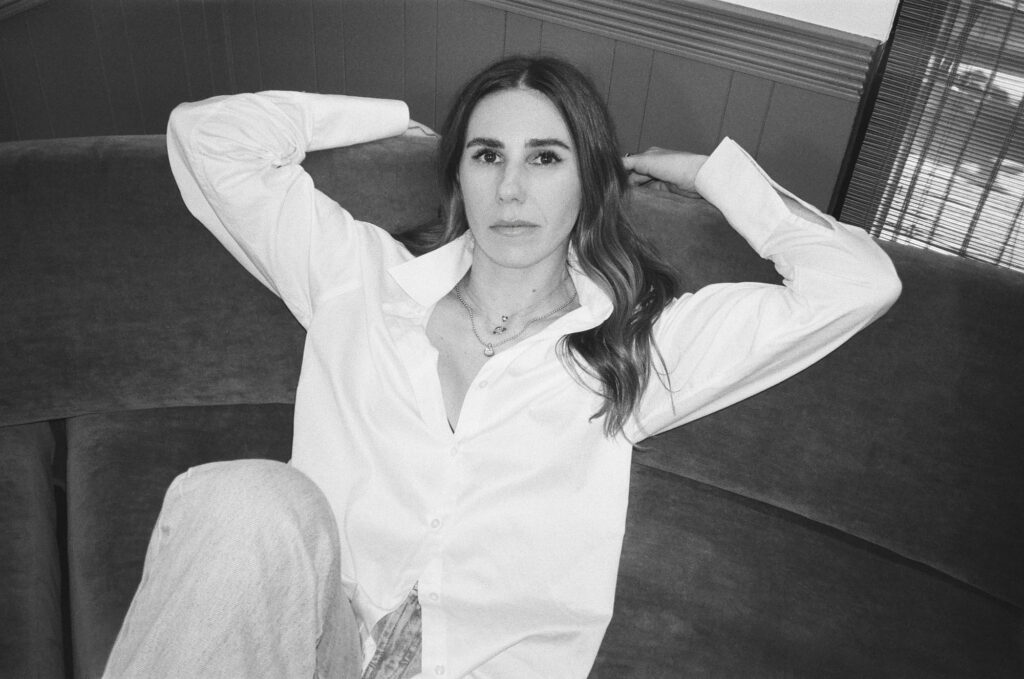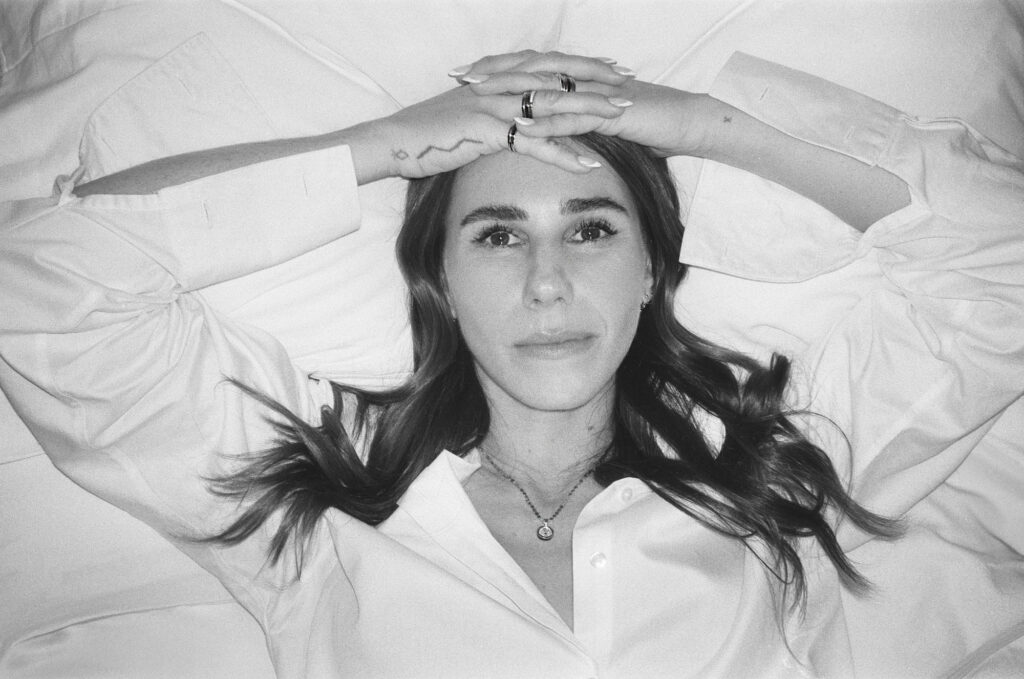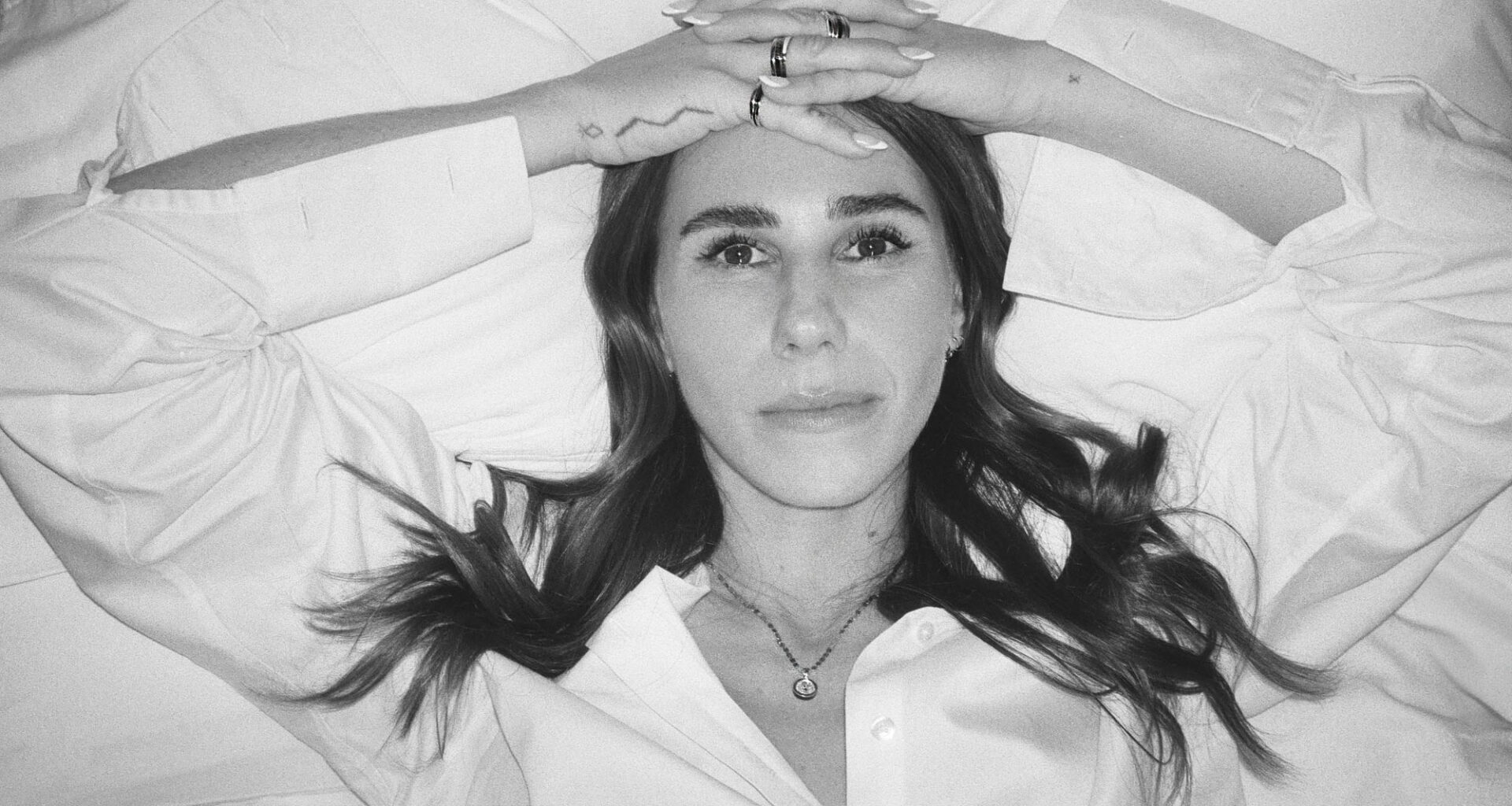 All photography by Alexandra Arnold and courtesy of Zosia Mamet.
All photography by Alexandra Arnold and courtesy of Zosia Mamet.
Does This Make Me Funny?, Zosia Mamet asks in the title of her new book of essays, which is alternately humorous, devastating, and startlingly intimate. The actor—best known for her role as Shoshanna Shapiro in Girls, or to industry folk as the daughter of writer David Mamet and actor Lindsey Crouse—takes readers through her childhood on the fringes of the spotlight, working with abusive or listless agents, her television breakthrough and subsequent career wins, bouts of depression, and terrifying and wonderful relationships.
The publication follows 2022’s My First Popsicle, a collection of essays about “food and feelings” that Mamet brought together from writers as far-ranging as Patti LuPone and Jia Tolentino. That was the project that solidified the third prong on what has become a three-pronged career—the other two being acting in projects like Laid or Luca Guadagnino’s forthcoming Artificial, and competitively riding her horse Love Bug aka “Herbie.”
But Does This Make Me Funny? marks a new level of vulnerability for an actor who has seemingly already laid herself bare onscreen. This time, there’s no character to dissect, just Mamet, as well as all of our feelings about the life she’s lived (there’s a nepo baby disclaimer in the forward here). Ahead of the book’s release Sept. 9, Mamet shares how it all came together.
This book was a rollercoaster. I learned you’re Jewish and very into Christmas. And that you and your Girls co-star Adam Driver both have dogs named Moose?
Yeah, welcome to my brain. It was very strange. Moose was a surprise Christmas present for my husband, so [Girls was] on hiatus at the time. I came back to shoot the next year, and we fully thought that it was such an original dog name. I was like, “We got a dog. Her name is Moose,” and Jemima [Kirke] was like, “Adam got a dog. His dog’s name is Moose.” I’ve also since met so many people who either have a dog named Moose, or they’re like, “My uncle’s dog is named Moose.” Is Moose like the “Jeff” of dog names?
You’ve got your horse, Herbie, as well. I thought there might be more horse in this book, just based on your other horse-filled channels.
You know how they say heartbreak makes for great songwriting content? I feel like trauma is maybe more vivid in your memory, so it’s easier to write about, and horses have always just been the antidote to the trauma. I feel like I wrote about everything else but them. But maybe that’s next.
In acting, or just being in the public eye, you’re putting yourself in a vulnerable position, but was this in a completely different realm?
For sure. It didn’t [feel that way] at first because the same protective function was available to me that exists when I’m acting—l just forget that people can consume what I’m creating, and it’s easy to do that because it’s not immediate. There’s such a large swath of time that exists between when I film something and when it comes out, and, during that period of time, l have no control over what the end product is. That existed when I was writing the first draft because it was the same sort of concept. It was like, “Okay, I’m gonna create something and I’m gonna give it away. Then once it comes out, I have no control over it.” The rude awakening was learning about having to edit my own work, which was just a constant reminder of the fact that I was creating this really, really vulnerable thing that was all me and no character. It’s terrifying.

How did you approach writing about so many real people in your life? In some ways, it’s a rite of passage for someone to call you up and be like, “That’s not exactly how I remember that happening.”
I was joking with our audiobook director the other day, who read one of the essays, and I was saying how badly I want [one of the guys featured] to sue me. I just think it would be so funny. I don’t think he will because it’ll make him look worse, but like I really hope that he does. l’ve never really been someone who is good at creating with a plan. My husband started in the theater so he came up learning that you do weeks of work at the table, you break down a play, and you really get into the nitty gritty of the architecture of the characters and their arc; I came up in television where the scripts were changing up, and often during filming. The way I learned to create was very on my toes. When I wrote, I didn’t really have the ability to plan ahead and be like, Maybe I should hold back on that bit or not mention this person. Interestingly enough, the call that we had with the publishing lawyer, the things that I thought that she was gonna flag, she totally didn’t.
The whole project has a very reading-from-the-diary feeling. Is that a kind of writing you kind of grew up embedded in?
One of my favorite writers that I came to later in life is Eve Babitz, who I feel like writes very much that way. One of my favorite Bukowski novels is essentially his diary about his last hurrah. I’ve always been drawn to that. Or David Sedaris. If that’s a diary, it’s an incredibly well-written diary. I remember years ago I was talking to Stephanie Danler because I was playing around with writing a novel that was a meta version of my family, but I was like, “I don’t really know how to write about this without writing about it, and I’m worried that it’ll rock the boat too much.” She was like, “There are no rules. You can write a story, you can tell a story, you can write a novel, you can write nonfiction. You can write it however you want to.” That seems reductive and obvious, but for some reason to my brain, and honestly a lot of writers, it’s not. Writers like [Bukowski], like Eve, like Dave Eggers, people who just break the mold and write in their voice without trying to filter it or morph it into something else, they were very big influences on me. I can be a writer the way I wanna be a writer, and it doesn’t need to look like someone else or sound like someone else.
How do you find the next book you want to read?
It depends on the mood that I’m in and what’s happening in my life. When I’m working, my brain can’t encompass anything that requires too much additional usage, so I read a lot of beach read thriller novels. l love to thrift, so I’ll also just scour thrift stores, old bookstores, and, sort of in the same way that I pick wine, it’s really the cover of the book. I’m like, “That’s pretty,” and then I’ll pick that up. l’ve actually found some of my favorite books that way. I also do that wandering the library. When I find an author that I love, I like to just read everything they’ve written.
Is there a book that you loved as a child that still holds a warm place in your heart?
From the Mixed-Up Files of Mrs. Basil E. Frankweiler. And The Phantom Tollbooth will always be a favorite. I was such a huge reader as a kid.

Is there a book that ruined you, but in an amazing way?
What book would you nominate to the horse-girl canon?
If you want something that’s a horse-girl summer beach read, Girls and Their Horses is so much fun.
Is there a book you stopped reading in the middle and never finished?
l’ve tried to read War and Peace like five times. Honestly, it’s not the writing. It’s the fact that I can’t keep the fucking characters straight. I just feel like there are three different people named Alexei, and I’m like, Which one are we talking about?
I want to hear your book nominations now.
I have five. I thought it was only supposed to be four?
It’s as many as you’re willing to share with the world.
We would be here for 7 hours.
Zosia Mamet’s Required Reading
The Funny Divorce Novel: Heartburn by Nora Ephron, 1983 ($17.00)
The Bicoastal Bildungsroman: Sex and Rage by Eve Babitz, 2017 ($16.95)
The WWII Bildungsroman: City of Thieves by Dave Benioff, 2008 ($19.00)
The Female Rage Thriller: Animal by Lisa Taddeo, 2021 ($18.99)
The Family Drama: Long Island Compromise by Taffy Brodesser-Akner, 2024 ($14.95)
All books featured on CULTURED are independently selected by our editors, contributors, and interview subjects. We may earn affiliate revenue when you buy something.

